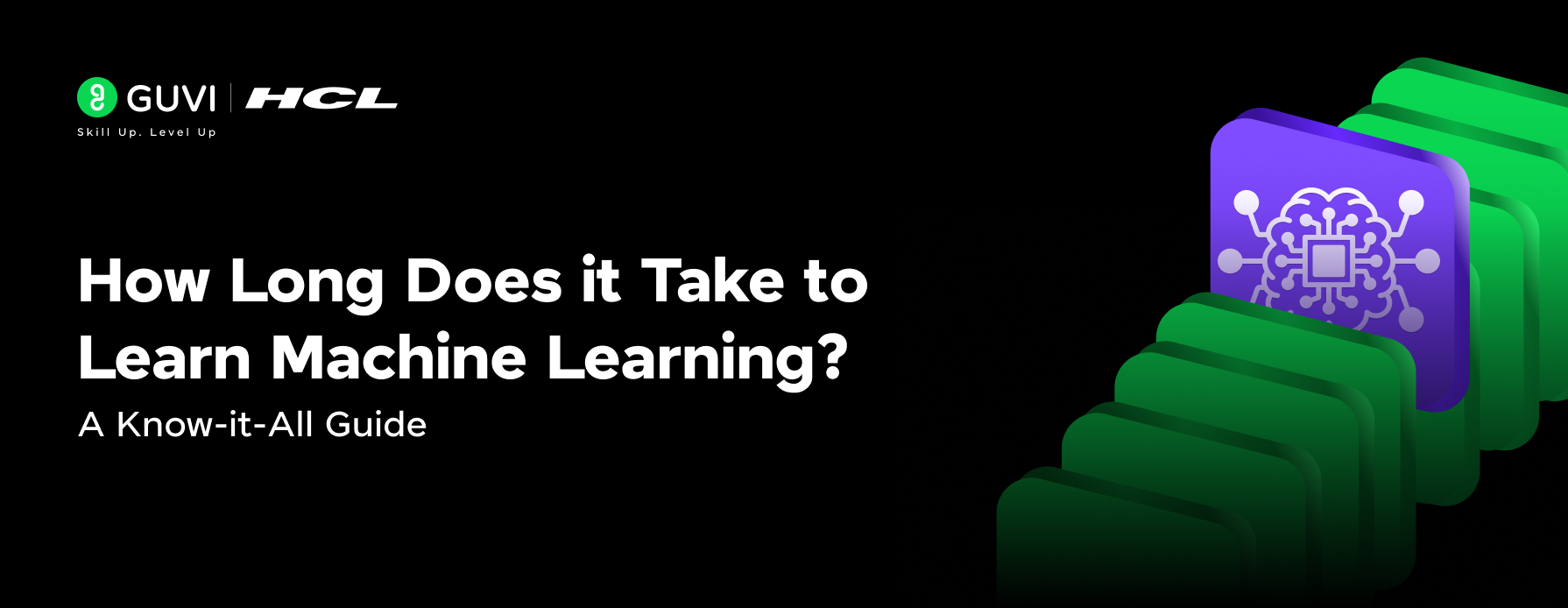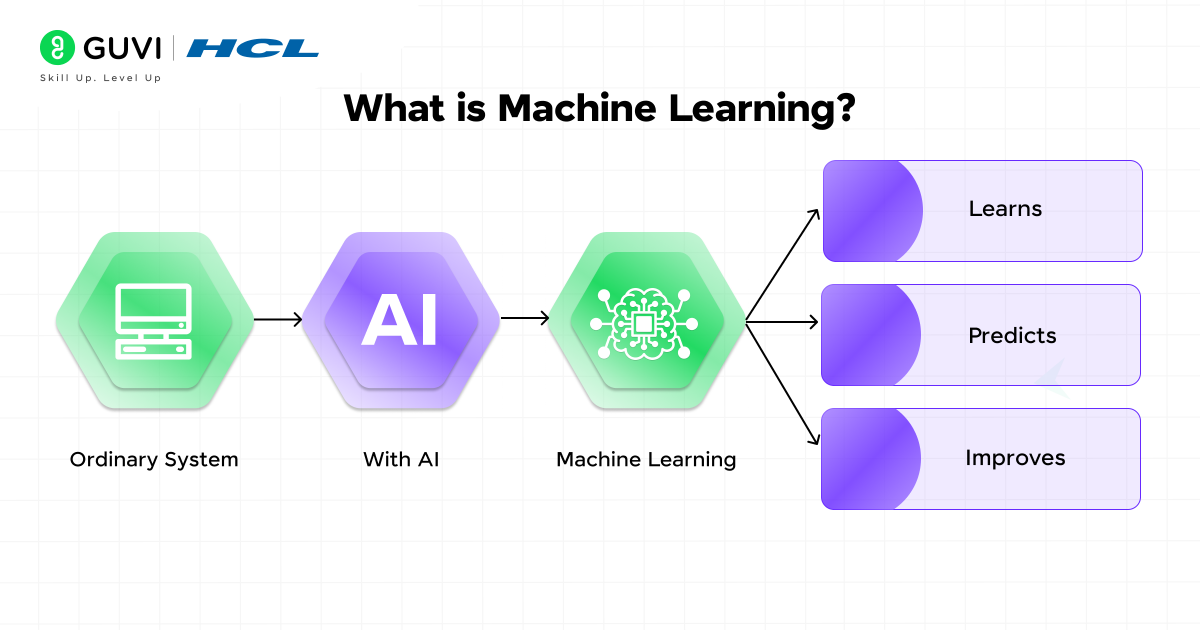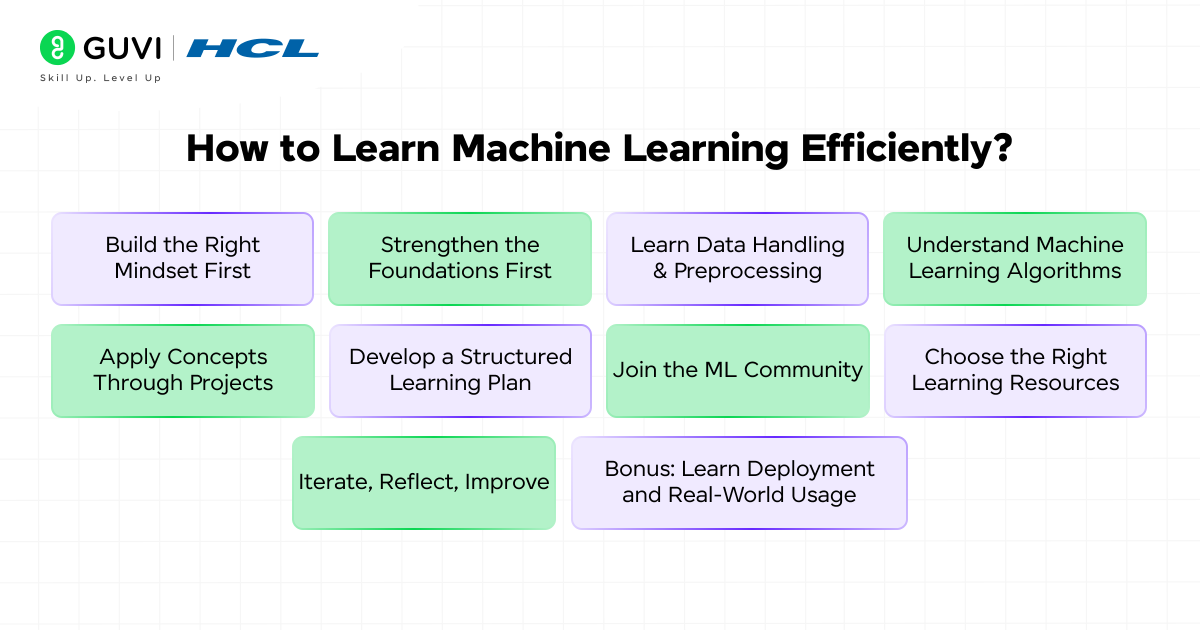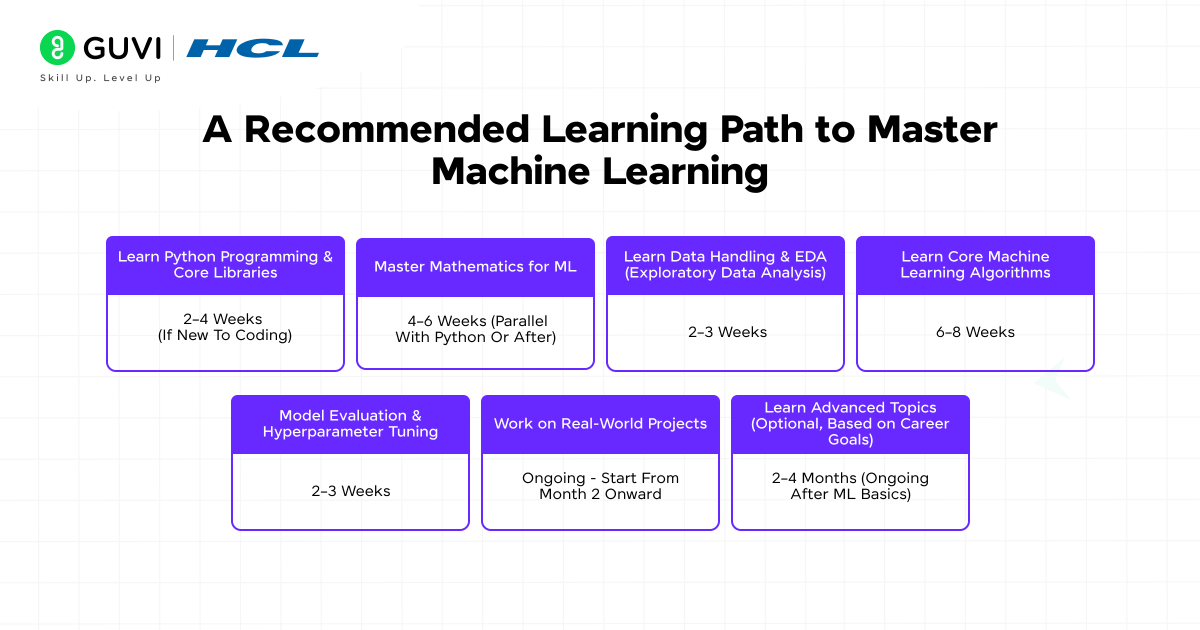
How Long Does it Take to Learn Machine Learning? A Know-it-All Guide
Apr 04, 2025 5 Min Read 5052 Views
(Last Updated)
Machine learning is a constantly growing field that has captured the interest of countless aspiring individuals as it’s not only interesting but highly rewarding. However, one common and significant question that arises is how much time it takes to actually learn machine learning?
In this in-depth article, we will explore and discuss at length the factors that influence the learning duration, recommend an ideal learning path, estimate time requirements at various learning stages, explore strategies for optimizing the learning process, and enlist valuable learning resources and platforms.
Whether you’re a beginner or a master seeking to enhance your skills, I hope this guide will help you navigate your ML journey and provide you with more clarity.
Table of contents
- What is Machine Learning?
- How to Learn Machine Learning Efficiently?
- Build the Right Mindset First
- Strengthen the Foundations First
- Learn Data Handling & Preprocessing
- Understand Machine Learning Algorithms
- Apply Concepts Through Projects
- Develop a Structured Learning Plan
- Join the ML Community
- Choose the Right Learning Resources
- Iterate, Reflect, Improve
- Bonus: Learn Deployment and Real-World Usage
- A Recommended Learning Path to Master Machine Learning
- Learn Python Programming & Core Libraries
- Master Mathematics for ML
- Learn Data Handling & EDA (Exploratory Data Analysis)
- Learn Core Machine Learning Algorithms
- Model Evaluation & Hyperparameter Tuning
- Work on Real-World Projects
- Learn Advanced Topics (Optional, Based on Career Goals)
- Sample 6-Month Learning Timeline (Assuming 10–12 hrs/week)
- Final Tip
- Concluding Thoughts...
- FAQs
- Is it hard to learn machine learning?
- How long will it take to learn Python for machine learning?
- Can I learn AI without coding?
- Is machine learning a lot of coding?
- Which is harder AI or ML?
What is Machine Learning?

Machine learning is a discipline within artificial intelligence (AI) that empowers computers to learn and improve from experience without explicit programming. It involves algorithms that analyze data, identify patterns, and make predictions or decisions.
Machine learning is like teaching a computer to learn from experience. Instead of giving it step-by-step instructions for everything, you feed it lots of data and let it find patterns and make decisions on its own.
For example, you can show a machine learning program thousands of pictures of cats and dogs, and it will learn to tell the difference between them. It’s used in many areas like recognizing speech, predicting stock prices, and recommending movies. The more data it gets, the better it becomes at making accurate predictions or decisions.
Through iterative learning, machines adapt and optimize their performance, enabling them to handle complex tasks efficiently.
How to Learn Machine Learning Efficiently?

Machine learning is one of the most in-demand and exciting fields in tech today. But with its vast ecosystem of tools, algorithms, and mathematical foundations, it’s easy to feel overwhelmed.
Efficient learning isn’t about rushing, it’s about learning smart, structuring your journey, and applying your knowledge consistently. Let us see how:
1. Build the Right Mindset First
Before you jump into code or theory, your mindset determines how far you’ll go. Machine learning is a deep and constantly evolving field, so starting with the right attitude and learning approach is critical to staying motivated and consistent.
- Be Curious, Not Just Ambitious: ML is constantly evolving; treat it like a lifelong skill.
- Be Comfortable with Uncertainty: You won’t understand everything right away, and that’s okay.
- Learn by Doing, Not Just Watching: Videos alone won’t make you good at ML. Practice will.
2. Strengthen the Foundations First
Machine learning sits on the shoulders of math, statistics, and programming. You may struggle with higher-level concepts without a strong foundation in these core areas. This section helps you get your base right.
a) Learn Core Math Concepts
You don’t need a Ph.D., but these topics are essential:
- Linear Algebra: Vectors, matrices, eigenvalues, dot products.
- Calculus: Derivatives, gradients, partial derivatives.
- Probability & Statistics: Bayes theorem, distributions, mean/variance, standard deviation.
b) Get Comfortable with Python
Python is the go-to language for ML.
- Learn data structures, functions, and OOP.
- Master libraries like NumPy, Pandas, Matplotlib, and Seaborn.
- Understand basic syntax, file handling, and APIs.
Also Learn About: 6 Compelling Reasons to Choose Python for Machine Learning
3. Learn Data Handling & Preprocessing
In ML, data is king. Knowing how to clean, analyze, and prepare data is more important than building models initially. This step ensures you feed your algorithms with high-quality, meaningful input.
a) Learn to Clean and Prepare Data
Garbage in = garbage out. Master:
- Handling missing values
- Data scaling and normalization
- Encoding categorical data
- Feature engineering
b) Master Exploratory Data Analysis (EDA)
This helps you understand your data before modeling:
- Identify correlations, distributions, and outliers
- Use visualizations (histograms, box plots, pair plots)
4. Understand Machine Learning Algorithms
This is where the real magic begins. Learning how algorithms work and when to use them gives you the power to turn raw data into insights and predictions. Start with the classics and build up.
a) Learn Core Algorithms by Category
Start with these categories:
- Supervised Learning:
- Linear Regression, Logistic Regression
- Decision Trees, Random Forests
- Support Vector Machines (SVM)
- Unsupervised Learning:
- K-Means Clustering, Hierarchical Clustering
- PCA (Principal Component Analysis)
- Reinforcement Learning (Advanced):
- Q-learning, Markov Decision Processes
Read More on the Difference Between Supervised and Unsupervised Learning
b) Learn Model Evaluation
- Accuracy, precision, recall, F1 score
- Confusion matrix, ROC-AUC curve
- Cross-validation techniques
5. Apply Concepts Through Projects
Theory alone won’t cut it, application is where true learning happens. Machine Learning Projects help you test your knowledge, learn from mistakes, and build a portfolio to showcase your skills.
a) Start with Beginner-Friendly Datasets
- Predict Taxi Fares with Random Forests
- Predicting Credit Card Approvals
- Store Sales Analysis and Forecasting
b) Move on to Intermediate Projects
- Sentiment Analysis using NLP
- Find Movie Similarities from Plot Summaries
- Recognising Flower Species with Computer Vision
6. Develop a Structured Learning Plan
With so many resources out there, it’s easy to get lost. A structured plan helps you stay on track, measure your progress, and ensure you’re learning in the most efficient way possible. You get to understand more about this in the next section!
7. Join the ML Community
Machine learning can get overwhelming if you learn in isolation. Engaging with the community helps you stay inspired, solve problems faster, and stay updated with the latest trends.
- Follow ML researchers, Kaggle Grandmasters, and AI influencers on Twitter or LinkedIn
- Join communities like:
8. Choose the Right Learning Resources
Not all tutorials are made equal. Picking high-quality, beginner-friendly, and up-to-date learning resources can accelerate your growth and give you clarity in complex areas.
a) Free Courses
- Andrew Ng’s ML course (Coursera)
- Google’s Machine Learning Crash Course
- Fast.ai (practical deep learning)
b) Books
- “Hands-On Machine Learning with Scikit-Learn, Keras & TensorFlow” by Aurélien Géron
- “Pattern Recognition and Machine Learning” by Christopher Bishop
- scikit-learn, TensorFlow, PyTorch
- Jupyter Notebooks
- Google Colab (for free GPU)
- GitHub (for portfolio)
9. Iterate, Reflect, Improve
Learning ML is not a straight line. You’ll build models that fail, and that’s okay. What matters is analyzing what went wrong, learning from it, and improving with every iteration.
- After each project, write a case study or blog post about what you learned.
- Revisit failed models and tune hyperparameters.
- Learn to read research papers and stay updated with arXiv or Papers with Code.
10. Bonus: Learn Deployment and Real-World Usage
Learning ML doesn’t end with building models. Knowing how to deploy them into real-world applications adds immense value and bridges the gap between theory and real-life problem-solving.
Most ML beginners skip this part – don’t be one of them!
- Learn Flask or FastAPI to wrap models into APIs
- Use Streamlit to build interactive ML apps
- Host projects on Heroku, Render, or Hugging Face Spaces
Learning machine learning efficiently is about balancing theory with practice, staying consistent, and being part of a learning community. You don’t need to be a genius to master it, just be relentlessly curious and keep building.
A Recommended Learning Path to Master Machine Learning

Learning machine learning efficiently requires structure. Here’s a curated step-by-step roadmap that builds core skills gradually while offering estimated timeframes for each stage. You can customize this based on your background, available time per week, and learning goals.
1. Learn Python Programming & Core Libraries
Timeframe: 2–4 weeks (if new to coding)
As discussed earlier, Python is the backbone of modern machine learning. It’s beginner-friendly and has a rich ecosystem of libraries.
What to Focus On:
- Basic syntax, loops, functions, OOP
- File handling and data structures
Libraries: NumPy, Pandas, Matplotlib, Seaborn
2. Master Mathematics for ML
Timeframe: 4–6 weeks (parallel with Python or after)
Math helps you understand why algorithms work, not just how to use them. It boosts your confidence when tuning or building models.
What to Cover:
- Linear Algebra: Vectors, matrices, matrix operations
- Calculus: Derivatives, gradients, chain rule (for optimization)
- Probability & Statistics: Bayes’ theorem, distributions, hypothesis testing
3. Learn Data Handling & EDA (Exploratory Data Analysis)
Timeframe: 2–3 weeks
Real-world datasets are messy. Before building any model, you need to clean, explore, and preprocess data properly.
What to Practice:
- Handling missing values, outliers, and duplicates
- Feature engineering and encoding
- Data visualization (correlations, distributions)
4. Learn Core Machine Learning Algorithms
Timeframe: 6–8 weeks
This is the heart of machine learning – building, training, and tuning machine learning models using historical data.
What to Learn:
- Supervised Learning:
- Linear Regression, Logistic Regression
- Decision Trees, Random Forests
- Support Vector Machines (SVM)
- Unsupervised Learning:
- K-Means, DBSCAN
- PCA (Dimensionality Reduction)
- Model Training Techniques:
- Overfitting/Underfitting
- Train/Test Split, Cross-Validation
5. Model Evaluation & Hyperparameter Tuning
Timeframe: 2–3 weeks
Building a model is easy. Evaluating whether it’s good or not is where skill comes in.
What to Focus On:
- Accuracy, Precision, Recall, F1-score
- ROC-AUC, Confusion Matrix
- Grid Search, Random Search, Cross-validation
Tools:
- sklearn.metrics
- Hyperparameter tuning with GridSearchCV
6. Work on Real-World Projects
Timeframe: Ongoing – start from Month 2 onward
Projects help you apply what you’ve learned, build a portfolio, and prepare for interviews or freelance work.
Project Ideas:
- Predict stock prices using regression
- Sentiment analysis of tweets (NLP)
- Image classification using CNNs (deep learning)
- Build a movie recommendation engine
7. Learn Advanced Topics (Optional, Based on Career Goals)
Timeframe: 2–4 months (ongoing after ML basics)
Options Based on Direction:
- Deep Learning (DL): Neural Networks, CNNs, RNNs, GANs (TensorFlow / PyTorch)
- Natural Language Processing (NLP): Tokenization, BERT, Transformers
- Reinforcement Learning: Q-learning, Deep Q-Networks
- MLOps & Deployment: Model deployment, APIs, monitoring tools
Tools to Learn:
- TensorFlow / PyTorch
- Hugging Face Transformers
- Docker, Flask/FastAPI, Streamlit for deployment
Sample 6-Month Learning Timeline (Assuming 10–12 hrs/week)
| Month | Focus Areas |
| Month 1 | Python + Math Basics |
| Month 2 | EDA + Core ML Algorithms (Supervised) |
| Month 3 | Unsupervised Learning + Evaluation Metrics |
| Month 4 | Projects + Kaggle Competitions |
| Month 5 | Deep Learning / NLP (Optional) |
| Month 6 | Model Deployment + Resume / Portfolio Building |
Final Tip
Break big concepts into small daily chunks. Use the “Learn → Apply → Reflect → Share” loop:
- Learn: Watch/read a concept
- Apply: Use it in a real dataset or mini-project
- Reflect: Write a blog or journal what you learned
- Share: Post it on GitHub or LinkedIn
This habit compounds your learning over time!
If you want to kickstart your Machine Learning journey in the best way possible, then consider enrolling in GUVI’s IIT-M Pravartak Certified Artificial Intelligence & Machine Learning Course, where you will master technologies like matplotlib, pandas, SQL, NLP, and deep learning and build interesting real-life machine learning projects.
Concluding Thoughts…
Woah, that was quite the discussion! In conclusion, I think the time it takes to learn machine learning varies greatly depending on factors such as how much you already know and your commitment to learning.
To make sure you use your precious time well, focus on all algorithms and techniques and how they differ in their applications. But you must practice and build projects and engage with open-source communities to enhance your skills and knowledge.
FAQs
Learning machine learning can be challenging, but it’s not impossible to master. Start with the basics, understand core concepts, and gradually tackle more complex topics, for an in-depth guide, refer to the article above.
For beginners, a good foundational grasp of Python basics might take 2-3 months, while becoming proficient in machine learning can take 6-12 months of dedicated learning and practice.
You can learn AI without coding but only to some extent, through user-friendly tools and platforms that offer a graphical interface for creating AI models. But, to truly understand AI concepts, troubleshoot, and develop custom solutions, you will definitely need coding skills in a few languages, Python to begin with.
Not a lot lot but machine learning does involve a substantial amount of coding. You need to be able to write code for data preprocessing, model selection, training, evaluation, as well as deployment. Proficiency in programming languages like Python is crucial.
According to me, both AI and ML are pretty much the same levels of difficulty as both of them are interrelated but distinct fields. AI encompasses a broader range of techniques, including ML. Whereas ML focuses on training algorithms to learn from data. So for a beginner, both of them will be equally difficult and get easier with time.


















![A Beginner's Guide to AI Agents, MCPs & GitHub Copilot [2025] 8 ai agent](https://www.guvi.in/blog/wp-content/uploads/2025/07/ai-agent.webp)
![Spring Boot AI: A Beginner’s Guide [2025] 9 spring boot](https://www.guvi.in/blog/wp-content/uploads/2025/07/spring-boot.webp)





Did you enjoy this article?